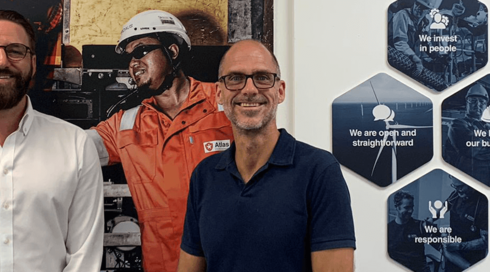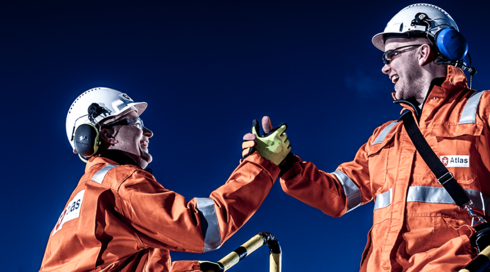4 July 2014
Colm Power, Barge Master
Not only his father, but his grandfather and his great-grandfather were fishermen; all the inhabitants of the Irish village where Colm Power grew up were in some way involved in the fishing industry. “Ever since I was young, I wanted to become the captain of a fishing boat. I was brought up as a fishermen’s child, and from all the tales that I had been told and the various trips that my father had taken me on when I grew older, I couldn’t imagine myself becoming anything else than a skipper on a fishermen’s boat.”
However, not long after Colm had worked his way up from mate and deckhand to skipper, the fishing industry collapsed. In 2002, Colm got the opportunity to go offshore with a mini-supply vessel owned by an Egyptian company. In the two years that followed he was awarded all the certificates necessary for working on vessels that provide support to various operations, such as ROV, pipe laying and seismic surveys. In Colm's capacity of master, the day-to-day running of the vessels were his main responsibility, including the safety and management of the crew.
After six years of working on all kinds of oil and gas projects, Colm decided it was time for something new. Not without reason, he made the switch to the renewable industry: "My brother was working in offshore wind energy and what he had told me about it was appealing. What attracted me most was that this new industry was about clean energy. I liked the idea of working in a durable energy business. And until now, the switch has given me a good feeling. The oil and gas industry is rather old school to me."
Although Colm has mastered many types of vessels over the years, he will probably never forget his first time on a cable-laying barge. "We had to lay a cable from Wales to Ireland. I remember that I had to get the barge onto the beach and set it on the ground, literally on the bottom. I felt like I was doing the total opposite of what I was supposed to be doing. Basically, it was throwing overboard everything that I had been taught." That wasn't the only thing different from being the captain of a barge instead of a fishing boat. "Steering a barge is mostly about relying on its stability. If you're used to sailing a fishing boat, then being the captain of a barge is living life in the slow lane. Naturally, different vessels require different skills. As a captain you must always have the skills to manoeuvre without anchors and to measure the natural forces that help or hinder the vessel. For me, moving about with all the anchors is quite a different experience. Being able to move the barge a half-meter or even a quarter-meter is very challenging; luckily, I enjoy the challenge and the results even more."
The next challenge that awaits Colm is working with Dynamic Positioning (DP) systems, relatively new computer-based systems currently used to maintain the stability of a vessel. "Now, when working with cable-laying barges, we simply use five anchors—one on each corner and one in the middle. This makes manoeuvring quite a bit more difficult compared with a DP system. Imagine moving an entire vessel based on experience and feeling rather than on a computer system that does everything for you. Although anchors are old-fashioned, you can’t really go beaching with DP. And you have to know how to operate things when the system fails." Colm refers to the difficult situations as “the good fun of the job”. "What you could be dealing with, for example, is bad weather. When the tension increases, you need to prevent an anchor from breaking because this could split a cable in half. We always work with two thrusters on the barge so we can move the anchor again, but in these situations you need to keep your head."
After years of experience in the fishing industry and having worked with a number of companies in the renewable industry, Colm has learned what it takes to become a good master. "Being a good communicator is very important; a good master has to have excellent social skills to allow him to communicate well with everyone on board. Also, you have to be able to stay in control under all circumstances and to know how to behave and act in threatening situations. Staying calm is the main task, really."
The years of experience in the fishing industry have given Colm the advantage of acquiring extensive knowledge of vessels. "Back in the early fishing days in Ireland, fishermen had to develop more skills than only manoeuvring a ship. Learning about electricity and machinery was vital, and although I have no official qualifications, I have gained a lot of engineering experience. As a fisherman you have all kinds of technical problems that you need to solve yourself. That is just the way it is on fishing boats because when you are at sea, there is no workshop nearby. You have to fix things then and there, with the few tools available. These experiences brought me to the position where I am now, and are still beneficial every day.”
In addition to his love of the sea and the various technical challenges, Colm likes his work for another reason as well. "I like the rosters that allow me to be home as much as I am away. Every time I come home feels like a holiday. I don’t always like being away for longer periods, but when I come home I can totally relax without having to worry about work." Colm has been always grateful for having a great family that supports what he does. The communication systems of today make things easier as well. "It is quite effortless to communicate with my family because there's almost always a good internet connection as most of the work that we do is close to shore, or even in harbours. Besides, by now my family is used to me being away for longer periods; my oldest daughter is sixteen and all she’s ever known is me being away from time to time. Sometimes there have been problems while I’ve been away and then it's difficult that I can’t be there for them, but the long periods when I'm home fulltime make up for a lot."
Having followed such a long and varied career path, and having seen how the industry has grown over the years, Colm is very interested in two new developments. "I would love to play a role in the further development of tidal energy. I strongly believe we have to keep investing and believing in new alternatives to traditional ways of producing energy." Until there's an opportunity allowing him to take his next step, Colm wants to become more experienced in using DP systems. "I’d like to get involved with DP in the future because that’s the way forward; I'm sure that in the end everything is going to be on DP. Whatever happens, the simple feeling of being on a vessel that responds to my steering in whatever way is something that I will never tire of."
.png)
.png)


